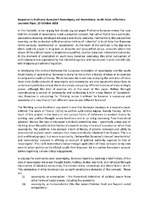Response to Prathama Banerjee's sovereignty and ascendancy: south Asian reflections
Abstract
In this fantastic, wide-ranging but closely argued paper Prathama Banerjee makes the case that the concept of sovereignty is not a universal concept, but rather that it has a particular, substantive meaning developed in Europe over many centuries. Furthermore, this substantive meaning can be contrasted with alternative notions of 'rulership' in South Asia that Banerjee terms variously 'overlordship' or 'ascendancy'. At the heart of this contrast is the degree to which political power is imagined as absolute and unqualified versus accounts where the power of the political leader is imagined as qualified, counterbalanced , networked and nodal. At the moment of colonialism in south Asia, Banerjee concludes, this latter conception of political power was supplanted by the colonial imaginary and reproduced in post-colonial rule, with indigenous traditions forgotten. In developing this contrast between the European conception of sovereignty and the south Asian theory of ascendancy, Banerjee is doing far more than a history of ideas or an exercise in comparative political theory. This is because she is not only analyzing the evolution of ideas down time (both accounts of sovereignty and ascendancy are also arguments about how to understand political practice). Nor is she simply comparing different theories of state or kingly power, although this kind of exercise sits at the heart of this paper. Rather, through reconstructing a version of sovereignty and contrasting it with a new theory of 'ascendant' rule, Banerjee is advocating for 'thinking across traditions' to become 'a composer and assembler of a new theory from different sources and different histories'.
URI
https://www.academia.edu/37639337/Response_to_Prathama_Banerjeehttp://hdl.handle.net/10566/5836

